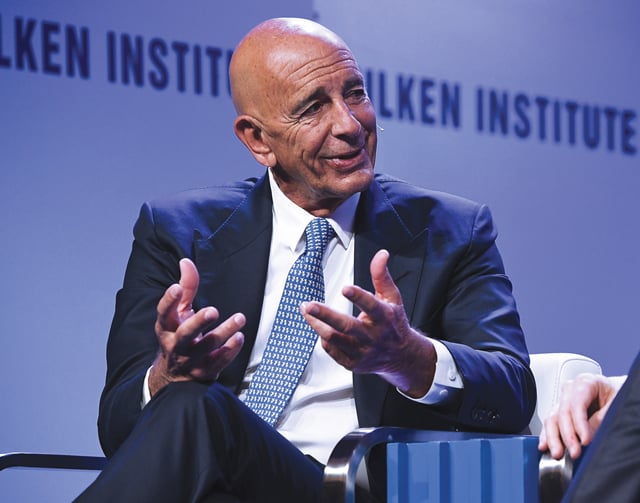
Downtown-based real estate investment company Colony Capital Inc. and activist investor Blackwells Capital have reached a settlement in a monthslong dispute over Colony’s leadership and direction.
The agreement calls for Colony and Blackwells to form a joint venture to buy Colony’s stock and prop up its share price. The company’s shares plunged more than 70% between Feb. 20 and March 20, alongside the broader coronavirus-driven market downturn. The Dow Jones Industrial Average fell by 34% over that same period.
Colony has also agreed to nominate Blackwells-backed Jeannie Diefenderfer to its board, handing the activist investor a fourth seat on Colony’s 12-member board.
Blackwells has agreed to drop its bid to nominate five directors to Colony’s board, to vote in favor of all of the board’s recommendations for the next three years and to refrain from making certain major changes in its position for the next 10 years through a standstill agreement.
Blackwells Chief Investment Officer Jason Aintabi voiced support for Colony Capital Executive Chairman Thomas Barrack and Chief Executive-elect Marc Ganzi. “We stand behind Mr. Barrack and his vision in rotating to a global digital platform along with the recruitment of a first-class executive in Marc Ganzi to lead Colony,” Aintabi said in a statement. “We are confident that Marc Ganzi’s management team and the board will do an excellent job of building upon Tom Barrack’s visionary leadership.”
The praise marked an abrupt about-face for Aintabi, who just weeks before had called Barrack’s pivot to digital real estate investments a “seemingly baseless shift in corporate strategy (made to) better align the company with Mr. Ganzi’s narrow field of expertise.”
Aintabi’s change of heart was unexpected, according to Dean Kim, an executive director and analyst at Playa Vista-based investment research firm William O’Neil & Co. Inc. “I was a bit surprised to see the 180-degree turn,” Kim said. He added that there was little outlined in the settlement that seemed to support Blackwells’ dramatic change in position.
Kim noted that a number of unseen factors, such as Blackwells’ belief that Colony leadership will be more receptive to their recommendations in the future, could have influenced the decision.
Blackwells embarked on an aggressive regime-change campaign at Colony last
year. The investor sent a series of open letters to the company’s board demanding that Barrack step down, citing his “enormous personal distractions and tangible conflicts of interest” as contributing factors in the company’s poor performance.
Colony has been in a downward spiral for the better part of three years.
“When you look at the 2017 and 2018 impairment losses that they recorded on their financial statements, it’s eye-opening,” Kim said.
Impairments are losses that occur when the cost to hold onto an asset exceeds its fair market value.
The real estate investment company reported more than $632 million in impairment losses in 2018, up from $420 million the year before. The troubles started when the company expanded its portfolio to include office, industrial, health care and other assets through the purchase of NorthStar Asset Management Group and real estate investment trust NorthStar Realty Finance Corp. in early 2017. The ill-fated move burdened Colony with a host of inherited property-level issues that hamstrung business performance.
In a bid to generate cash and recover, Colony has shed assets, such as its $5.7 billion industrial investment portfolio and made moves to shift emphasis to digital real estate investments, such as data centers and communication towers.
